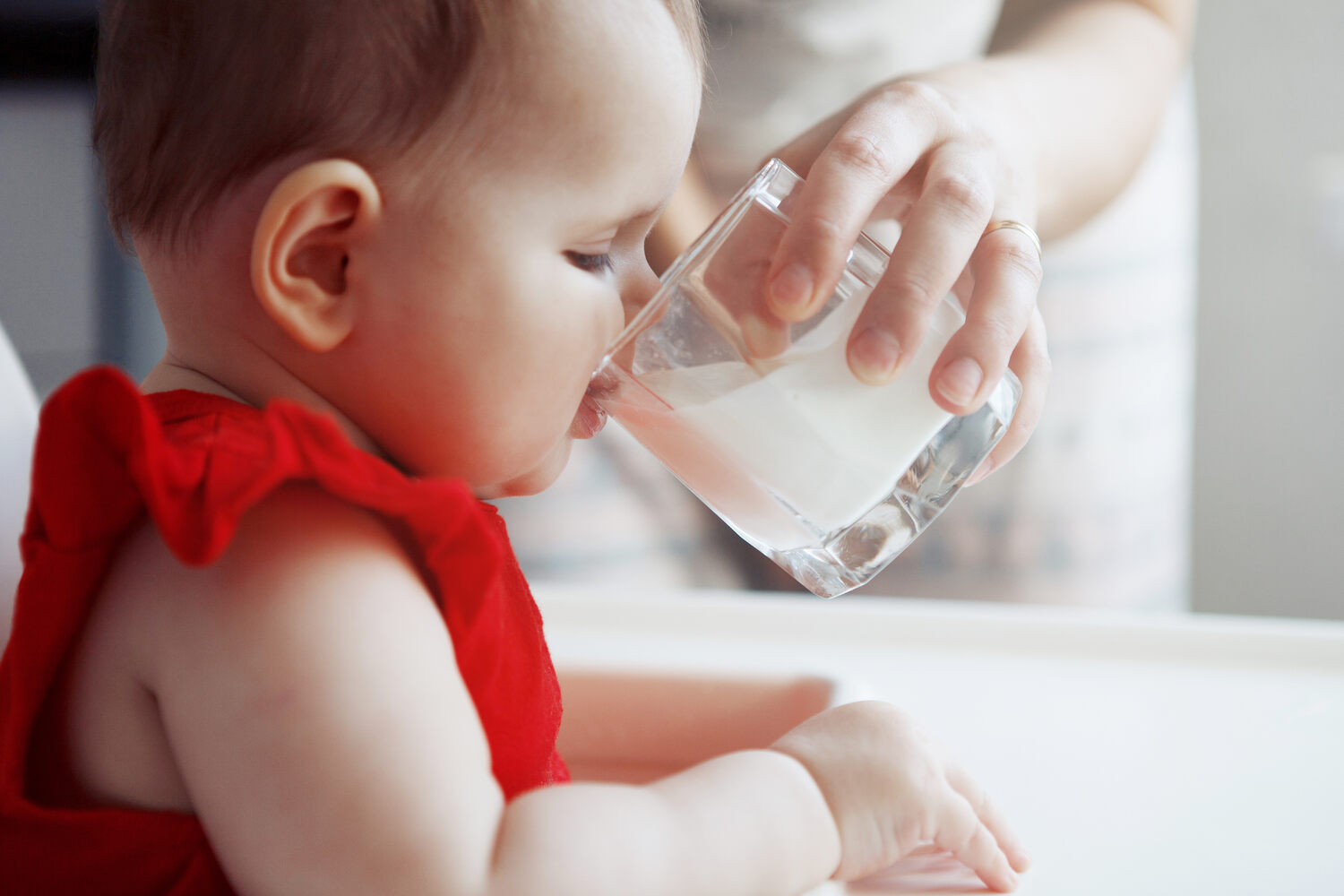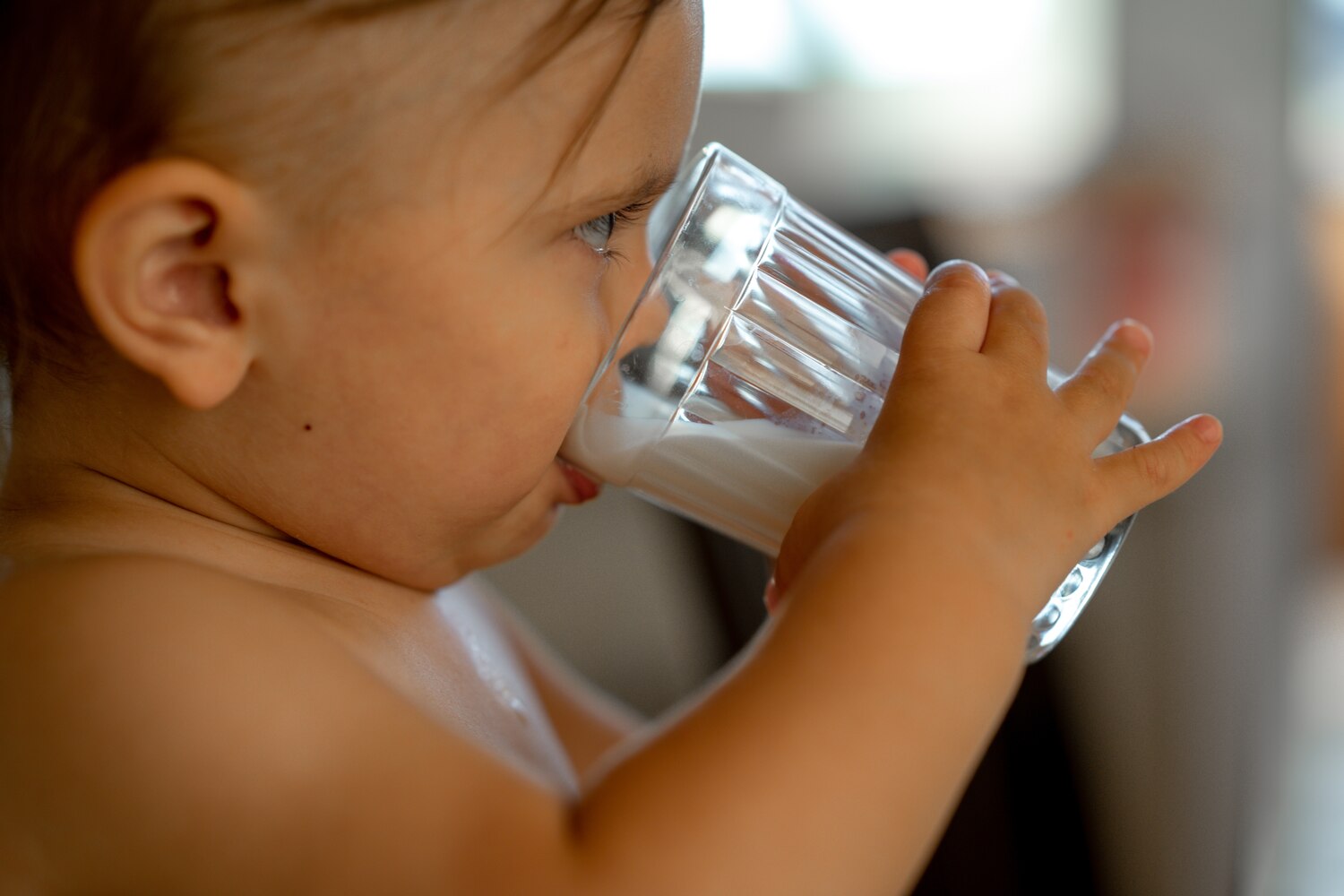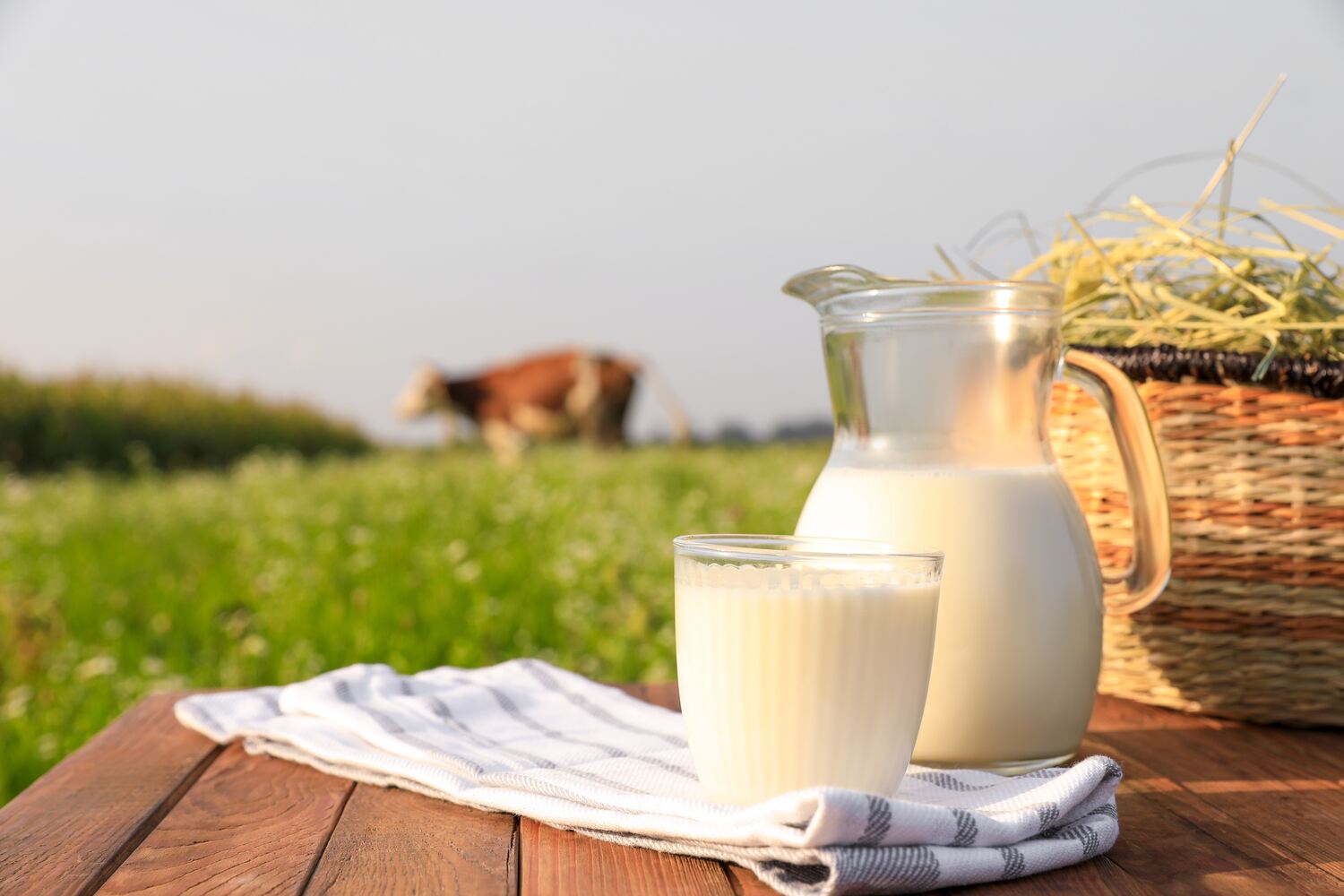
Cow milk is considered one of the most nutritious additions to a baby’s diet. Cow milk is considered next best to mother’s milk both in terms of nutrients and easy digestibility. But it is equally important to introduce it at the right age to avoid nutritional deficiencies and digestion issues.
Breast milk and formula provide more iron and other essential nutrients to babies under the age of six months than cow’s milk does. Doctors and nutritionists recommend avoiding giving cow milk until your baby turns one through a bit of addition to cooked foods is still permitted. Here is everything you need to know about the right way and age of introducing cow milk to babies.
In This Article
- When Can I Introduce Cow Milk to My Baby?
- How to Introduce Cow Milk to Babies?
- Nutrition Value of Cow Milk
- Nutritional Benefits of Cow Milk For Babies
- Can Cow’s Milk Cause Constipation in Babies?
- What to Do if My Baby Refuses Cow’s Milk?
- Should I Give My Baby Whole Milk Or Low Fat Milk?
- Identifying Cow Milk Allergy in Babies
- Precautions When Giving Cow Milk to Babies
- FAQ’s
When Can I Introduce Cow Milk to My Baby?
Experts worldwide recommend waiting till the first birthday before introducing cow’s milk to a baby (1). Here are the reasons why early introduction of cow milk may not be advisable for your little one.
- Cow’s milk can be taxing on the digestive system of a baby. High, concentrated levels of proteins and minerals make cow’s milk much more difficult to digest than breast or formula milk (1A).
- Your baby does not get enough iron from cow’s milk (1B). Your baby could develop iron deficiency anemia as cow’s milk can lead to blood in the stools (2).
- Cow’s milk does not contain the healthiest type of fat required for growing babies.
- Allergies due to irritation to the baby’s lining of the digestive system are also a cause for concern.
- Cow milk may irritate the baby’s kidneys as well, leading to blood in the bowels.
Once the baby starts taking solid foods and is about six months of age, you can give them foods cooked with a bit of cow’s milk for example porridges, but not as a complete meal or drink on its own.
After 6 months, breast milk does not provide your baby with the RDA of iron. Mothers should try and introduce iron rich foods to prevent any deficiencies.
How to Introduce Cow Milk to Babies?

Once the infant is a year old, they can be given full-fat cow’s milk.
Introduce the new milk to your baby in a sipper cup. You can offer it as a snack or as a main course.
Most babies enjoy experimenting with different tastes, and while some babies will readily accept cow’s milk, some may not.
This is also the right time to get rid of the bottle if your baby takes feeds through the bottle. Offer them milk in a cup instead of giving it in a bottle. However, you can still continue to breastfeed your baby.
Here are some useful pointers when introducing cow’s milk to your baby.
- Do not start with over 350ml of cows’ milk. Until the age of 3 years, infants do not require more than 16 ounces of 473.18 ml of milk a given day.
- Try to break the servings of milk into 2 or 4 smaller feedings, in a soft beaker or cup with a lid. Smaller feedings will enable the body to accept the change in digestion.
- Do not treat cow’s milk as a substitute for breast/formula milk. It is a supplement – you can continue to breastfeed the baby and give cow’s milk as well.
- If you find it difficult to make your baby drink cow’s milk, you could try mixing a little amount of cow’s milk in formula or breast milk and feed them. In this case, you can increase the amount of cow’s milk in her feeds slowly and gradually till they get used to the taste.
- Do not add sugar or sweeteners to the milk. Sugar will add to the calories and may result in obesity in the long run
Nutrition Value of Cow Milk

The below lists the nutritional value of cow’s milk and some of the vital nutrients and their quantities (3).
Energy – 60 kcal
Protein – 3.28 g
Fat – 3.2 g
Carbs – 4.67 g
Sugars 4.81 g
Calcium – 123 mg
Iron – 0 mg
Vit A – 208 IU
Vit B12 – 120.54 µg
Vit C – 0 mg
- Cow milk is a good source of high-quality protein and various fats. Carbs make up around 5% of milk, primarily in the form of milk sugar aka lactose.
- It contains minerals that are vital for newborn bone health, including calcium, phosphorus, magnesium, vitamin D, and protein.
- It also contains a wide range of vitamins and minerals, including vitamin B12, calcium, riboflavin, and phosphorus.
Nutritional Benefits of Cow Milk For Babies

The majority of existing scientific research suggests that consuming cow’s milk and dairy products helps babies meet their nutrient requirements (4).
Here are some of the benefits of cow milk for babies.
1. Improves Bone Density
Cow milk’s high calcium content can improve bone mineral density during infancy, reducing the risk of osteoporosis in adulthood.
2. Packed With Protein
Milk is a high-quality protein source with all nine essential amino acids. It may aid in the development and growth of the muscles and tissues of infants.
3. Betters Heart Health
Milk contains potassium, which can aid in the growth and development of blood vessels as well as the proper function of the baby’s heart.
4. Boosts Immunity
Cow milk contains beneficial micronutrients like vitamin E, selenium, and zinc. These nutrients boost your baby’s immunity and protect him from diseases.
4. Promotes Brain Health
It contains a lot of vitamin B, which helps relax your infant and maintain a regular sleep pattern. Vitamin B12 has been shown to increase memory and sharpness by promoting the overall brain development of a growing kid (5).
Can Cow’s Milk Cause Constipation in Babies?
Yes, cow milk can constipation in babies. The protein in cow milk may interfere with bowel movement and inflammation, which can contribute to constipation and anal fissures in some cases (6). You may notice that your infant passes stools less regularly after being introduced to cow’s milk; nonetheless, babies sometimes experience constipation when introduced to a new diet.
New meals or milk can disrupt your baby’s bowel movements, so don’t be concerned unless there is a significant delay. Furthermore, when your baby’s digestive tract matures, she will absorb an increasing amount of nutrients from her meal, resulting in insufficient waste production.
What to Do if My Baby Refuses Cow’s Milk?

So your little one does not like the taste of cow’s milk, making you wonder how they will get the necessary nutrition. If the baby refuses to have cow’s milk, you may consider supplementing their diet by adding other dairy products to her diet like yogurt, paneer, milkshakes, cottage cheese, etc.
You can also try mixing a bit of cow’s milk into her cereal and other foods, including breast and formula milk, increasing the quantity gradually. If your baby still does not like cow’s milk, look for alternative sources of calcium that also have vitamin D.
Should I Give My Baby Whole Milk Or Low Fat Milk?
Essential vitamins like A and D are found in fat, hence it is safe to start your baby with whole milk. Whole milk also helps your baby to gain weight normally and provides energy to the baby. Nonfat or skimmed milk may make the baby miss out on essential nutrients, and can also be heavy to digest.
The only possible exception is if your family has a history of obesity. After the age of two, low-fat milk should be started.
Cow’s milk is a good source of calcium, vitamins, magnesium, and protein. Calcium is vital for bone and teeth development.
As per the American Academy of Pediatrics (AAP), 2-3 cups of milk in a day is sufficient for the baby (7).
If the baby takes more than three cups of milk in a day, she might not feel hungry and may miss out on other essential nutrients present in various food items. However, never give your baby ‘raw’ or unpasteurized milk as it can contain harmful bacteria and parasites.
How to Identify Cow Milk Allergies In Babies

Some babies may be allergic to cow milk and the ratio is only 2-3%. Most babies overcome this allergy by the time they are three years old.
Most babies who consume cow milk-based formula or breast milk are not allergic to cow milk unless the mother avoids all dairy and the infant is not exposed to the complex.
If your baby is on hypoallergenic or soy milk, consult their doctor before introducing cow’s milk.
The early introduction of unmodified cow’s milk (before the baby turns one) into a baby’s diet may result in the development of food allergies, and allergic and hypersensitivity reactions (8). Many babies are sensitive to milk proteins (whey or casein) or milk sugar (lactose) and cannot digest cow milk.
Common symptoms of milk allergy are
- Blood in the stool
- Diarrhea and Vomiting
- Hives
- Rashes around the mouth and the chin
- A runny nose with a cough and constant wheezing
If your baby exhibits any of these symptoms after drinking cow’s milk, you must speak to their pediatrician. If the baby develops breathing issues, take them to the nearest emergency.
Disclaimer: Breastfeeding is essential for babies. The Ministry of Health recommends breastfeeding a baby till two years old (9).
Precautions When Giving Cow Milk to Babies
Here are some of the precautions you must follow when starting cow milk for your baby.
- Begin by switching one feeding per day with a sippy cup or a standard cup of full cow’s milk for your little one. Stat with half a cup. You can increase the quantity if your baby is tolerating it and now showing any allergic reactions.
- Incase your infant dislikes it, mix 1/2 cow’s milk and 1/2 breast milk or formula. Slowly reduce the content of breastmilk or formula over time.
- Offer cow milk as a morning and night feed to your baby rather than replacing main meals.
- Do not add water to cow milk because it reduces the nutritional density of macronutrients necessary for your growing baby.
- Do not feed your kid raw cow milk.
- Boil the milk thoroughly until it reaches 2-3 simmers, then cover it to store in the refrigerator.
- Always boil milk that comes out of the fridge, before feeding.
- Remember to test the temperature of milk before feeding it to your baby.
- Do not use sugar to sweeten the milk
- Refrain from adding flavorings such as carom seeds, fennel seeds, turmeric, ginger, or cardamom to the baby’s cow milk feed.
Wait until your infant is at least a year old before introducing whole cow’s milk. It is critical to ensure that your little one receives all of the nutrients they require, and cow’s milk is an important source of these nutrients. Try making the shift from bottle to sipper cup gradually while introducing cow milk. This can help avoid your baby’s tummy troubles. Cow’s milk isn’t necessary for a balanced diet, so don’t worry if your baby doesn’t enjoy it.
FAQ’s
1. Is Cow Milk Good For Babies?
Yes, cow’s milk is an excellent option for your baby. It provides a rich supply of protein, calcium, and calories for a growing infant. However, you should see a pediatrician before feeding cow’s milk to your kid.
2. When Can I Give Cow Milk to My Baby?
You can give cow’s milk to your kid when they are 12 months old. By this point, they have a well-balanced diet of solid foods such as cereals, vegetables, seasonal fruits, eggs, and meats.
3. Is Cow Milk Better Than Formula?
Cow milk is not better than formula because infants do not digest cow milk compared to breast milk or baby formula. Cow’s milk includes plenty of protein and minerals, which might stress a newborn’s developing kidneys. Cow’s milk contains insufficient levels of iron, vitamin C, and other nutrients that newborns require.
References
- Whole cow’s milk in infancy – PMC – [https://www.ncbi.nlm.nih.gov/pmc/articles/PMC2791650/]
- Cows’ milk induced intestinal bleeding in infancy – [https://www.ncbi.nlm.nih.gov/pmc/articles/PMC1029246/pdf/archdisch00547-0084.pdf]
- FoodData Central – https://fdc.nal.usda.gov/food-details/746782/nutrients
- A review of dairy food intake for improving health among black infants, toddlers, and young children in the US – ScienceDirect – [https://www.sciencedirect.com/science/article/pii/S0027968424000178#tbl0003]
- Vitamin B-12 and Cognition in Children – PMC – [https://www.ncbi.nlm.nih.gov/pmc/articles/PMC5015033/]
- Effect of Cow’s-milk–free diet on chronic constipation in children; A randomized clinical trial – PMC – [https://www.ncbi.nlm.nih.gov/pmc/articles/PMC7919185/]
- Healthy Beverage Quick Reference Guide Download – [https://downloads.aap.org/AAP/PDF/HealthyBeverageQuickReferenceGuideDownload.pdf]
- Infant and young child feeding – [https://www.who.int/news-room/fact-sheets/detail/infant-and-young-child-feeding]
